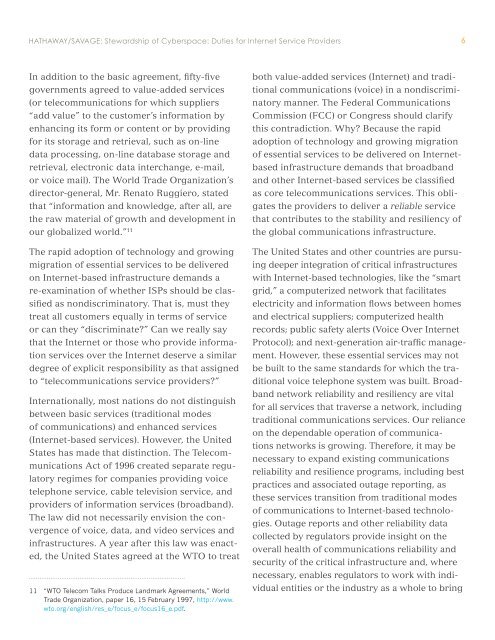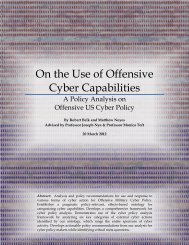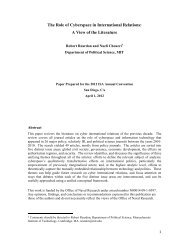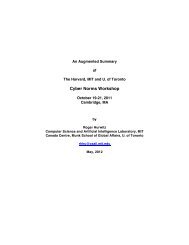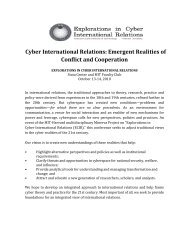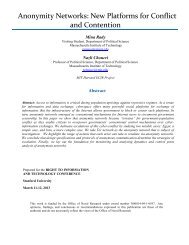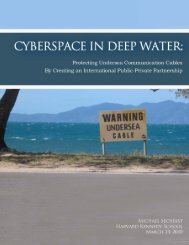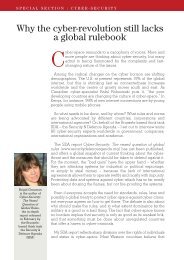Stewardship of Cyberspace: Duties for Internet Service Providers
Stewardship of Cyberspace: Duties for Internet Service Providers
Stewardship of Cyberspace: Duties for Internet Service Providers
Create successful ePaper yourself
Turn your PDF publications into a flip-book with our unique Google optimized e-Paper software.
HATHAWAY/SAVAGE: <strong>Stewardship</strong> <strong>of</strong> <strong>Cyberspace</strong>: <strong>Duties</strong> <strong>for</strong> <strong>Internet</strong> <strong>Service</strong> <strong>Providers</strong> 6<br />
In addition to the basic agreement, fifty-five<br />
governments agreed to value-added services<br />
(or telecommunications <strong>for</strong> which suppliers<br />
“add value” to the customer’s in<strong>for</strong>mation by<br />
enhancing its <strong>for</strong>m or content or by providing<br />
<strong>for</strong> its storage and retrieval, such as on-line<br />
data processing, on-line database storage and<br />
retrieval, electronic data interchange, e-mail,<br />
or voice mail). The World Trade Organization’s<br />
director-general, Mr. Renato Ruggiero, stated<br />
that “in<strong>for</strong>mation and knowledge, after all, are<br />
the raw material <strong>of</strong> growth and development in<br />
our globalized world.” 11<br />
The rapid adoption <strong>of</strong> technology and growing<br />
migration <strong>of</strong> essential services to be delivered<br />
on <strong>Internet</strong>-based infrastructure demands a<br />
re-examination <strong>of</strong> whether ISPs should be clas-<br />
sified as nondiscriminatory. That is, must they<br />
treat all customers equally in terms <strong>of</strong> service<br />
or can they “discriminate?” Can we really say<br />
that the <strong>Internet</strong> or those who provide in<strong>for</strong>ma-<br />
tion services over the <strong>Internet</strong> deserve a similar<br />
degree <strong>of</strong> explicit responsibility as that assigned<br />
to “telecommunications service providers?”<br />
Internationally, most nations do not distinguish<br />
between basic services (traditional modes<br />
<strong>of</strong> communications) and enhanced services<br />
(<strong>Internet</strong>-based services). However, the United<br />
States has made that distinction. The Telecom-<br />
munications Act <strong>of</strong> 1996 created separate regu-<br />
latory regimes <strong>for</strong> companies providing voice<br />
telephone service, cable television service, and<br />
providers <strong>of</strong> in<strong>for</strong>mation services (broadband).<br />
The law did not necessarily envision the con-<br />
vergence <strong>of</strong> voice, data, and video services and<br />
infrastructures. A year after this law was enact-<br />
ed, the United States agreed at the WTO to treat<br />
11 “WTO Telecom Talks Produce Landmark Agreements,” World<br />
Trade Organization, paper 16, 15 February 1997, http://www.<br />
wto.org/english/res_e/focus_e/focus16_e.pdf.<br />
both value-added services (<strong>Internet</strong>) and tradi-<br />
tional communications (voice) in a nondiscrimi-<br />
natory manner. The Federal Communications<br />
Commission (FCC) or Congress should clarify<br />
this contradiction. Why? Because the rapid<br />
adoption <strong>of</strong> technology and growing migration<br />
<strong>of</strong> essential services to be delivered on <strong>Internet</strong>-<br />
based infrastructure demands that broadband<br />
and other <strong>Internet</strong>-based services be classified<br />
as core telecommunications services. This obli-<br />
gates the providers to deliver a reliable service<br />
that contributes to the stability and resiliency <strong>of</strong><br />
the global communications infrastructure.<br />
The United States and other countries are pursu-<br />
ing deeper integration <strong>of</strong> critical infrastructures<br />
with <strong>Internet</strong>-based technologies, like the “smart<br />
grid,” a computerized network that facilitates<br />
electricity and in<strong>for</strong>mation flows between homes<br />
and electrical suppliers; computerized health<br />
records; public safety alerts (Voice Over <strong>Internet</strong><br />
Protocol); and next-generation air-traffic manage-<br />
ment. However, these essential services may not<br />
be built to the same standards <strong>for</strong> which the tra-<br />
ditional voice telephone system was built. Broad-<br />
band network reliability and resiliency are vital<br />
<strong>for</strong> all services that traverse a network, including<br />
traditional communications services. Our reliance<br />
on the dependable operation <strong>of</strong> communica-<br />
tions networks is growing. There<strong>for</strong>e, it may be<br />
necessary to expand existing communications<br />
reliability and resilience programs, including best<br />
practices and associated outage reporting, as<br />
these services transition from traditional modes<br />
<strong>of</strong> communications to <strong>Internet</strong>-based technolo-<br />
gies. Outage reports and other reliability data<br />
collected by regulators provide insight on the<br />
overall health <strong>of</strong> communications reliability and<br />
security <strong>of</strong> the critical infrastructure and, where<br />
necessary, enables regulators to work with indi-<br />
vidual entities or the industry as a whole to bring


